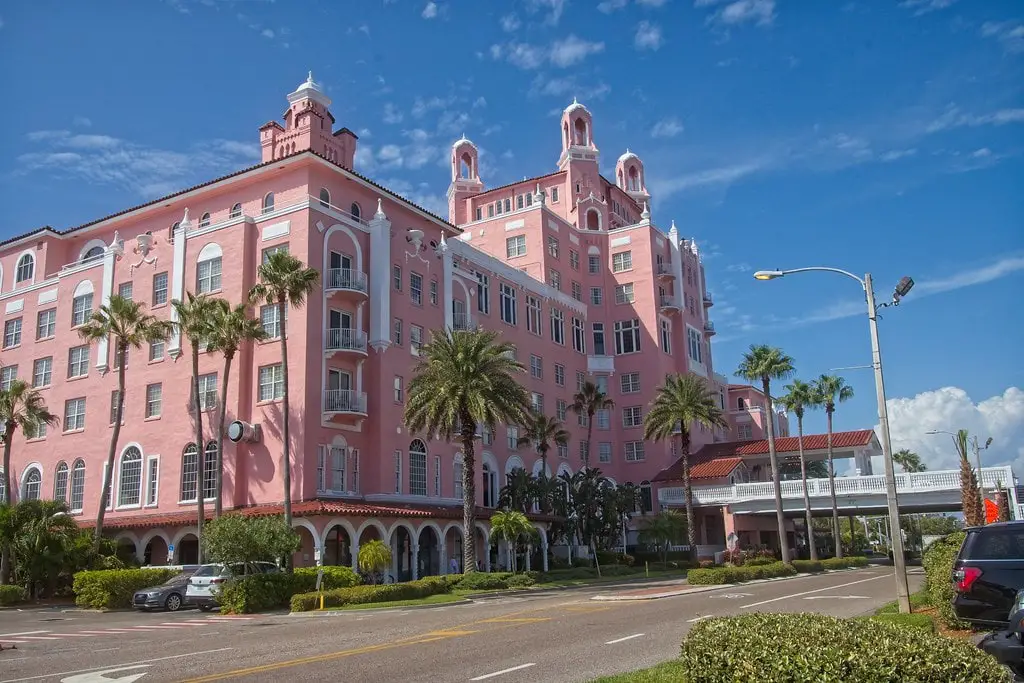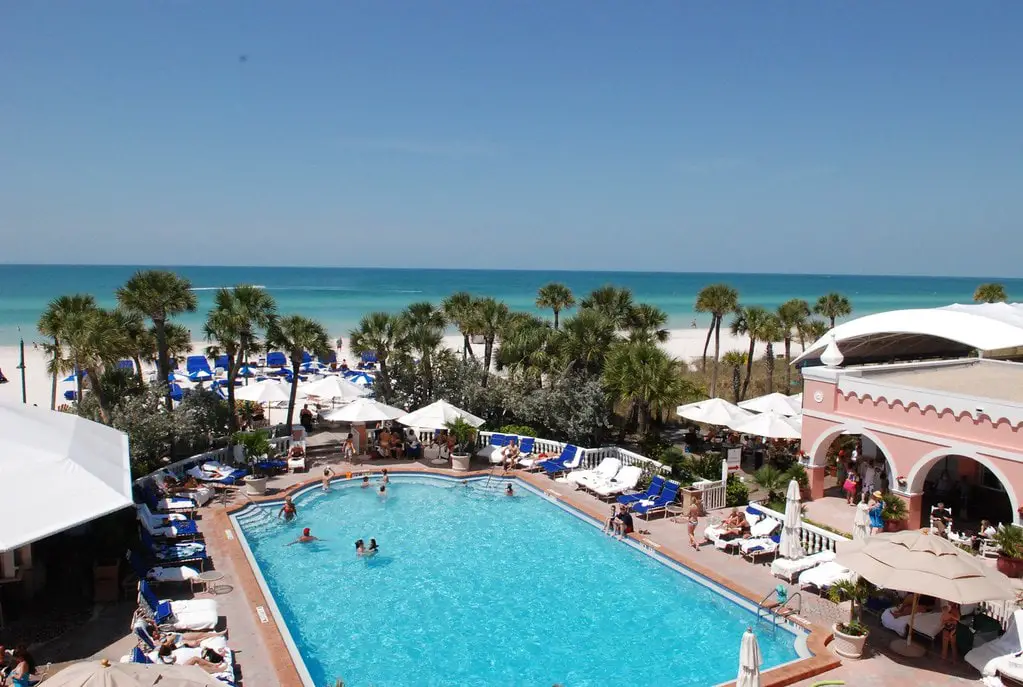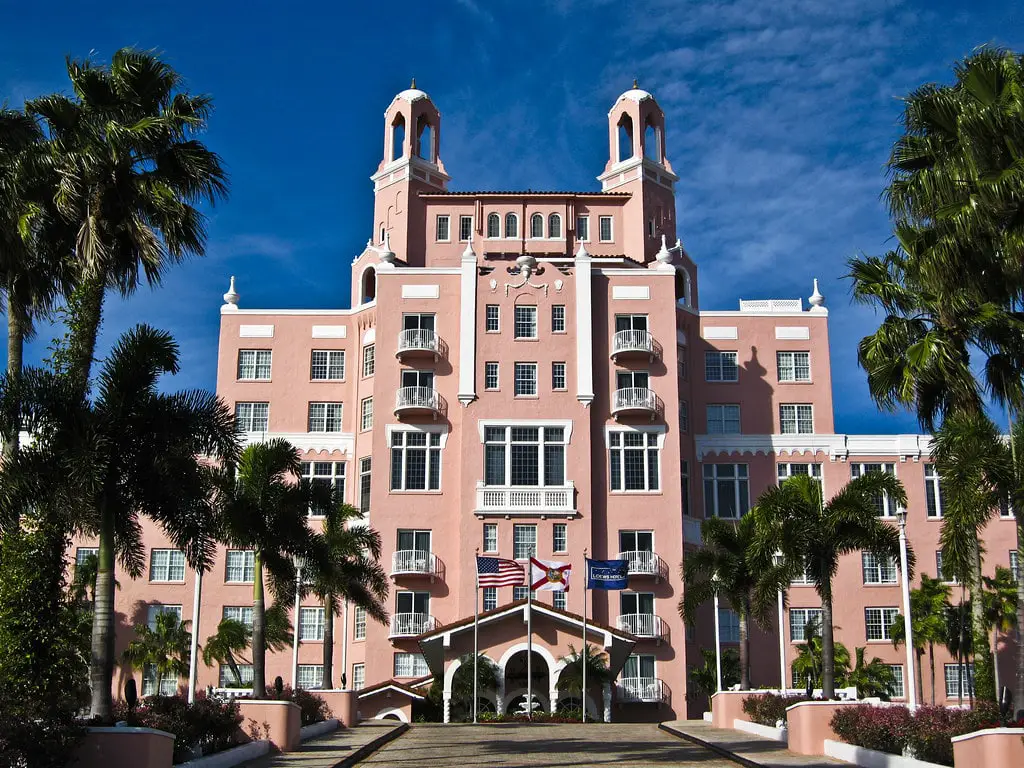A Journey Back to the Jazz Age: The Dawn of the Don CeSar Hotel
Step into a time machine and transport yourself back to the vibrant Jazz Age in the picturesque locale of Saint Pete Beach, Florida.
It’s 1928, marked by luxury, innovation, and a burgeoning cultural scene.
The elite of Tampa and St. Petersburg is preparing for an extravagant event – the grand opening of the “Pink Lady,” the monumental and magnificent tower known as the Don CeSar Hotel.
This architectural masterpiece rapidly gained favor with the rich and famous of the era, attracting luminaries such as Franklin D. Roosevelt, F. Scott Fitzgerald, Lou Gehrig, and Al Capone.
In addition, the hotel’s unique design, a creative blend of Mediterranean and Moorish styles, also became an emblem of luxury and grandeur.
Its arched openings, tower-like upper stories, and distinctively red clay tile roofs were a sight to behold, establishing the Don CeSar as a significant landmark of St. Pete Beach.
The Visionary Behind the Vision: The Story of Thomas Rowe
Thomas Rowe, the mastermind behind the Don CeSar, was more than a hotelier – a visionary. In 1924, he made a significant investment of $100,000 to acquire 80 acres of land in St. Petersburg.
This wasn’t just a business investment; it was the manifestation of his dream to construct a “pink castle” that would stand as a beacon of luxury and elegance in Florida.
Working in collaboration with architect Henry Dupont and contractor Carlton Beard, Rowe’s dream began to take shape.
The hotel was named the Don CeSar, inspired by Don César de Bazan, the hero of William Vincent Wallace’s opera Maritana.
The original design was for a six-story hotel with 110 rooms, but the ambitious plan was expanded to house 220 rooms, leading to a cost overrun that sent the project 300% over budget.
However, every cent was worth it. With its stunning architecture and lavish interiors, the Don CeSar stood as a testament to Rowe’s vision and dedication.
The Don CeSar During World War II: A Time of Transformation
The glamour and grandeur of the Don CeSar were interrupted by an unforeseen event – the sudden demise of Thomas Rowe.
The hotel was left to his estranged wife with Rowe’s passing and began deteriorating. However, with the advent of World War II, the Don CeSar found a new purpose.
The United States Army purchased the property for $450,000 and transformed it into a military hospital.
As a result, this era saw a profound transformation for the Don CeSar Hotel, as it evolved from a luxurious retreat for high society into a healing haven for the United States Army Air Corps.
This chapter in its history underscored the versatility of the Don CeSar and its capacity to serve the community in times of crisis.
The Resurgence of the Pink Lady: A Tale of Restoration and Renewal
In the 1970s, the Don CeSar made a triumphant comeback, reminiscent of a phoenix rising from its ashes. Initially, the General Services Administration had plans to demolish the then-vacant and graffiti-covered hotel.

However, residents, valuing the historical and cultural significance of the Don CeSar, vehemently opposed this plan.
In a turn of events that marked the beginning of a new era for the hotel, the Don CeSar was sold to C.L. Pyatt and William Bowman Jr., franchise owners of Holiday Inn.
The duo restored the hotel to its former glory, marking its rebirth. The Don CeSar Hotel, now re-spelled without the hyphen, reopened its doors on November 23, 1973.
The hotel underwent numerous renovations in subsequent years to update its facilities and further enhance its offerings.
Enhancements to the hotel were made, most notably introducing a sprawling 4,000-square-foot spa, establishing a distinctive restaurant, and constructing an additional outdoor swimming pool.
The hotel also expanded to include a full-service beach club, prompting a change in its official name to The Don CeSar Beach Resort and Spa.

The Don CeSar Today: A Historic Legacy that Endures
Today, the Don CeSar stands as a symbol of resilience, cultural heritage, and architectural grandeur.
Despite facing numerous challenges over the years, the “Pink Lady” has always emerged victorious, maintaining its status as a beloved landmark of St. Pete Beach.
Its rich history and unique architecture continue to captivate locals and tourists alike.
The hotel’s membership in Historic Hotels of America and its recognition on the National Register of Historic Places testify to its enduring legacy.
The Don CeSar, with its captivating charm and enduring elegance, continues to be a significant part of Florida’s cultural fabric.
Ghost Stories and Popular Culture: The Mystique of the Don CeSar
Adding to its allure, the Don CeSar Hotel boasts a fascinating presence in popular culture.
In 1982, the Don CeSar earned a spotlight in the pages of National Geographic, captivating readers with a vibrant two-page pictorial spread.
Beyond its photographic appeal, it’s also gained a reputation for being haunted by the unchained ghost of its original owner, Thomas Rowe.
This intriguing aspect of the Don CeSar has captured many’s imagination, leading to two-hour ghost tours offered by a local sightseeing company.
These paranormal tales add an extra layer of mystique to the already captivating story of the Don CeSar.
Conclusion: The Timeless Appeal of the Don CeSar
The story of the Don CeSar is one of vision, transformation, resurgence, and enduring legacy. This iconic “Pink Lady” has seen the best and worst of times yet has always come out on top.
Yet, despite the changes over the years, one thing remains constant: the Don CeSar is where history, elegance, and hospitality meet.

As a property recognized on the National Register of Historic Places since 1975 and a founding member of the National Trust Historic Hotels of America in 1989, the Don CeSar Hotel stands as an enduring symbol of Florida’s rich heritage and cultural legacy.
In addition, its story is a testament to the resilience and enduring appeal of St. Pete Beach’s architectural gem.

We locals LOVE the Don, but the cost of parking has put visiting out of the question for most. Previous “comping” of parking when enjoying the hotel’s wonderful fare and amenities made visits worthwhile and doable. Sadly, no more😢!
I appreciate your comment. The Don CeSar is a local gem, and, unfortunately, parking costs are limiting access. Such establishments need to balance exclusivity with community involvement.